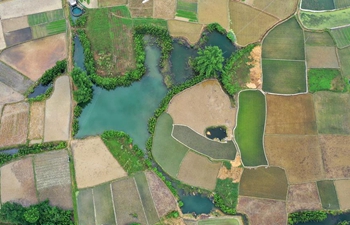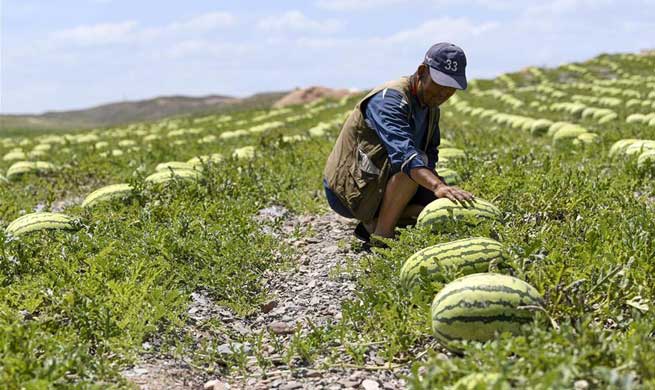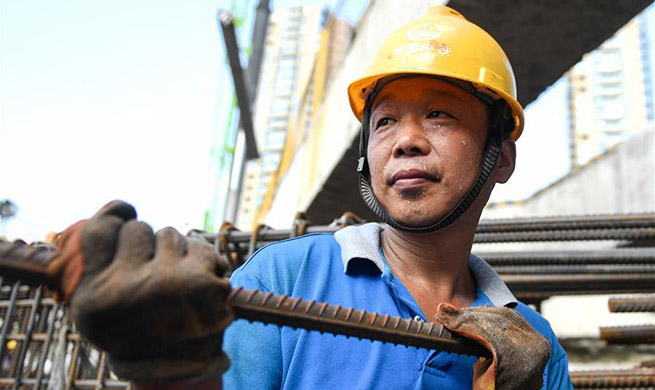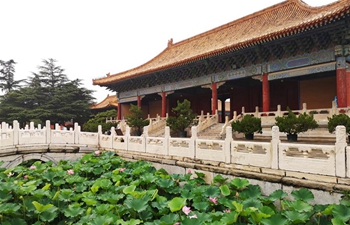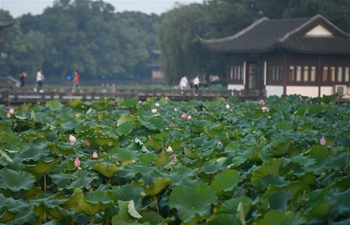BEIJING, July 24 (Xinhua) -- While it is customary for farmers to sow seeds into the soil, villagers in north China's Hebei Province are breaking the routine by sprouting seeds on paper.
Ma Fenglian, a 68-year-old farmer in Laiyuan County, dips a piece of paper measuring around one meter long and 20 centimeters wide in water, then takes it out and spreads it in a plastic crate before sprinkling buckwheat, sunflower or pea seeds on the wet paper.
The edible sprouts cultivated from seeds will be further processed into health products like sprout powder and sold all over the world.
This germination bed made from special paper was the brainchild of a Beijing-based firm named Green Valley, which set up a poverty-reduction workshop in Laiyuan, around 200 km away from Beijing.
The poor county, deep in the Taihang Mountain, has long been troubled by scarce arable land and poor transportation. Local residents have been fighting poverty for generations.
Ma's husband was sick and her children had to migrate to big cities for jobs. She used to make a living by farming. "Excluding the cost of seeds and fertilizers, there was not much money left," she recalled.
Two years ago, the local government relocated Ma and another 4,500 villagers living in deep mountains to Baishishan Township, where they were offered new houses with appliances and more importantly, jobs.
"A local cadre told me that a poverty-reduction workshop was recruiting workers early this year," Ma said. Toiling in the soil for decades, Ma was shocked on her first day at work.
In a workshop covering 1,500 square meters, plastic crates with green sprouts growing inside are placed neatly side by side on a four-layer shelf. "There was no soil at all. I saw people growing vegetables on paper," Ma said.
In mountainous areas with scarce cultivatable land, germinating seeds on paper can save land resources and labor cost while increasing farming efficiency, according to Zhang Guiqin, chairwoman of the Beijing Green Valley company.
"The paper contains biological nutrients and acts as a germination medium. As long as there is suitable air, moisture and temperature, seeds can sprout," Zhang said.
Paper has advantages over other mediums including sand and roseite thanks to its easier and cheaper sterilization process. However, Zhang pointed out that not all vegetables are suitable to grow on paper.
"What we need is edible sprouts, which are basically germinated seeds of certain crops or beans," she said.
China is committed to lifting its entire poor rural population out of poverty by 2020. Beijing's Fengtai District was paired off with Hebei's Laiyuan County over two years ago to cooperate in poverty alleviation.
The number of impoverished residents in the county has been reduced from over 40,000 by the end of 2016 to around 15,000 last year, statistics showed.
The project of "growing vegetable on paper" alone can offer 150 jobs for poor villagers and bring 140 million yuan (about 20 million U.S. dollars) of output value each year, according to Rui Yuanpeng, executive deputy county chief of Laiyuan.
Ma earns around 2,000 yuan a month. "I have long aspired not to be poor. This magic paper has made my dream come true," she said.




